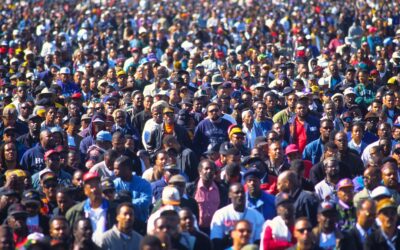What was once a storm whipped up around the question of whether the world needs 17 sustainable development goals and 169 targets has now degenerated into a...

David Steven
A Long Peace
Written in 2003, this report on the Future of Unionism in Northern Ireland argues that a functioning democracy in Northern Ireland is the only way to...
OECD States of Fragility Report – Meeting Post-2015 Ambitions
This afternoon, in New York, the OECD is launching its States of Fragility 2015 report which explores how new sustainable development goals and targets (SDGs)...
If Not Now, When? Ending Violence Against the World’s Children
As part of UNICEF UK’s Every Child in Danger campaign, CIC’s David Steven contributed research with an eye toward the political solutions necessary for ending violence against children. In this report, he describes the scale of the epidemic, reviews the likely post-2015 targets that will make a difference in combating violence, and proposes ways forward on the issue, urging political leadership and global partnership above all.
A Laboratory of Development – The Impact of Social Policies on Children in Latin America and the Caribbean
The Latin America and Caribbean region is distinguished by the range of policies that it has developed to respond to both the opportunities and risks of...
North-South, South-South, Triangular Cooperation, and ICT for Development to the implementation of the Post-2015 Development Agenda
Presentation by David Steven to the High-Level Event of the United Nations General Assembly on Contributions of North-South, South-South, Triangular...
Next Generation Pakistan: Insecure Lives, Untold Stories
Next Generation: Insecure Lives, Untold Stories is one of the largest pieces of qualitative research ever conducted in Pakistan and is rooted in a...
Pakistan’s Next Generation: Insecure Lives, Untold Stories
I’m in Lahore launching the third report from Pakistan’s Next Generation Task Force – I’m the Task Force’s director of research. In the first report, we...
Debating stable and peaceful societies
Today, the President of the UN General Assembly hosts a debate on ensuring stable and peaceful societies within the post-2015 development agenda. I am...
Ensuring Stable and Peaceful Societies
On April 24th and 25th, the President of the UN General Assembly will lead a thematic debate on ensuring stable and peaceful societies. At the request of the President of the General Assembly, I prepared a memo which highlights why peace and stability is important for sustainable development and how it might be addressed in the post-2015 development agenda. The outcome of this discussion will be included in the President’s summary and will be available as an input in the Open Working Group on Sustainable Development Goals (April 2014)
Fueling a New Order? The New Geopolitical and Security Consequences of Energy
Paper by David Steven, Bruce Jones and Emily O'Brien that examines impacts of the major transformation in international energy markets that has begun. The...
IMF: To solve inequality, tax food, books and funerals
The IMF has attracted plenty of favourable attention from unfamiliar places with two ‘staff papers’ (we’re enjoined to consider them as the personal opinions...
The Post-2015 Agenda: 3 thoughts on Latin America, and 1 on the Caribbean
Late last week, New York University’s Center on International Cooperation published A Laboratory for Sustainable Development? Latin America, the Caribbean and...
A Laboratory for Sustainable Development? Latin America, the Caribbean, and the Post-2015 Development Agenda
The Latin American and Caribbean region has a unique opportunity to exercise leadership and influence over the post-2015 development debate. The region's...
The CCC puts its thumb on the scale
Today the UK is debating whether or not to alter a legally enforceable carbon budget for 2023-2027 (Carbon Brief has an excellent explanation of the issues at...
Has lead poisoning driven Pakistan’s epidemic of violence? (updated)
Lead permanently damages young brains The impact of lead poisoning is devastating, especially just before and after birth: The nervous system of the fetus and...
Nelson Mandela RIP
"People must learn to hate, and if they can learn to hate, they can be taught to love."
Why can’t politicians ‘cut through’ on climate?
In the Guardian, Hugh Muir complains that the Daily Mail has “helped erode trust in the probity of the political establishment to the extent that politicians...
Who chooses? a response to Jishnu Das
There was widespread admiration in my Twitter stream yesterday for an article by World Bank Senior Economist Jishnu Das slamming The Economist for its support...
The UK’s Anti-Malala Backlash
Sadly, Malala Yousafzai became a controversial figure in Pakistan soon after she was shot and the theory that she is a pawn of the West is now entrenched....
More from Global Dashboard
Justice for children in detention during the pandemic
It is increasingly clear that the direct and indirect impacts of the global COVID-19 pandemic are not borne equally, hitting the most marginalised and vulnerable the hardest. As an infectious disease that thrives on people being in close proximity without access to...
We can’t rely on any leader to pull us out of the inequality crisis. It’s up to us.
The acute crisis of the present moment, COVID-19, has revealed the deeper crisis of our age: inequality. And looking around at the current crop at the top of politics, it sure is hard to identify the leader who will pull us out. Dominating much of the media and policy...
Switching Ministers and Crossing Canyons
At the end of July, after months of lockdown, my first trip outside The Netherlands was to Tunisia. Just before I flew, the Tunisian prime minister tendered the resignation of his government. That meant possibly another minister of justice; the fourth in a little over...



